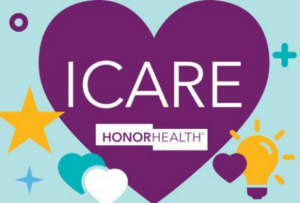Culture of well-being for patients and clinicians: Why compassion?
Each month, Tiffany Pankow, MD, vice president, chief of caregiver wellness and patient experience, will share a column on ways to enhance well-being and compassionate communication to improve outcomes for both patients and clinicians. She will also share how compassionate care is grounded in our ICARE values as well as highlight network efforts to improve clinician well-being. This month, Dr. Pankow focuses on understanding the importance of compassion to kick-off this new series.
“If you want others to be happy, practice compassion. If you want to be happy, practice compassion.” Dalai Lama
We often think of compassion as being most important to patients, but evidence shows that compassion matters as much or more for physicians and other clinicians. For most of us, it is the “why” for entering our profession…to make a difference for others, to save lives and to provide excellent quality care in a caring and empathetic way.
In a national healthcare system that often brings burdensome tasks, ongoing frustrations and other barriers, the doctor-patient connection is what continues to provide meaning and purpose. We also know that providing safe and quality care is vital to our own well-being. It turns out that compassion improves the safety and quality of care as well.
The very well researched book “Compassionomics” offers abundant evidence that compassionate care:
- Improves safety and reduces mistakes.
- Increases patient adherence to therapy.
- Reduces hospital stays and readmissions.
- Decreases pain and use of opioid analgesics.
- Enhances diagnostic accuracy.
- Mitigates physician/clinician burnout.
Unfortunately, evidence also shows that we are not always as good as we think we are at showing empathy. With our goal to be highly reliable and to continuously learn, each month we will feature ways to improve compassionate communication as well as to support our own well-being.
- Connect with patients on a human level. Ask them a bit about themselves (hobbies, family, work, or pets). It makes all the difference to be seen as a person not a patient.
- We can’t give what we don’t have. Practice self-compassion and take time for self-care. Take the self-compassion test to see where you are on the scale and see tips for improving your self-compassion.
- Take time this month to connect with colleagues. Go to the physician social on October 5th. RSVP – Medical Staff Social
- Learn more about peer support and/or well-being for clinicians by signing up here.
If you want to learn more about compassion and the impact on outcomes, check out the book “Compassionomics” by Stephen Trzeciak, MD, MPH, and Anthony Mazzarelli, MD, JD, MBE.

